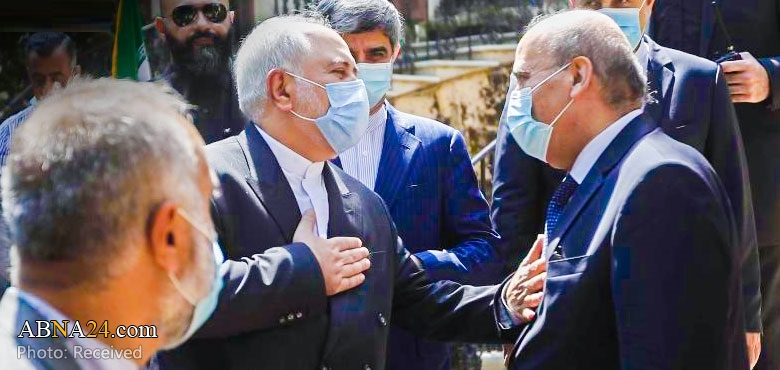AhlulBayt News Agency (ABNA): Iran’s Foreign Minister Mohamad Javad Zarif arrived in Lebanon on Thursday while the US Under-Secretary of State David Hill was already visiting the Lebanese capital Beirut.
The messages sent out by the visits of the two diplomats to Lebanon were quite different and even opposite.
Lebanon: Not place for foreign intervention
The Iranian FM described his trip as carrying a message of support and solidarity with disaster-hit Lebanese people. He said that the Islamic Republic was ready to unconditionally help the Arab country rebuild the enormous destruction caused by the huge explosion. On August 4, a huge blast rocked Beirut port, leaving over 150 dead and thousands injured, as well as a major part of the capital was reduced to ruins.
Iran’s help suggestion came while the US official asked for a role for an American investigation delegation in the blast probe. To put it more clearly, Washington has tied reconstruction aids to allowing the Americans to have a hand in the inquiry that seeks answers to the questions about the reason behind the explosion. This will help the US administration to pursue its interventionist goals in Lebanon.
Before the US official’s visit, the French President Emmanuel Macron had visited Beirut. Also, Germany FM Heiko Maas visited Beirut last week. Both made similar demands, tying their help to allowing their presence in the probe team.
On the opposite side, Iran underscored the non-interference principle in dealing with Lebanese conditions. Just like Iran, Russia held that the investigation is a Lebanese internal issue and up to the Lebanese people to perform it.
In other words, Lebanon is these days the theater to two totally different international visions. One vision wants others not to meddle in the Lebanese home affairs while offering Beirut full help to reconstruct, like Iran and Russia. The other vision is held by the West represented by Europe and the US. The Western countries want a role in the incident inquiry in return for promises of aids to Lebanon. This signals that the West is appetitive to force its way into the Lebanese inquiry for fresh meddling.
This Western push comes while the current Lebanese situation and the ashes of the explosion covering Lebanon are a direct corollary of the West’s interference in the country’s affairs. If we want to give a picture of the Beirut explosion culprit, it is the Western intervention though the West closes its eyes and seeks for somebody else to blame.
What does Iran want for Lebanon?
Zarif’s Beirut visit and meeting with the Lebanese officials was significant because it showed the Iranian support to Lebanon.
The Islamic Republic of Iran has always emphasized on an independent Lebanon and free from foreign parties’ intervention. This stance was held by Tehran since the Islamic Revolution of 1979 which removed the pro-Western monarchy in Iran and installed the Islamic Republic.
This emphasis on non-interference in Lebanon by the Islamic Republic which is held for four decades now is being highlighted by some regional states.
What is happening in Syria, Iraq, and Yemen is nothing but resistance to devastating foreign intervention in the home affairs of these Arab countries. This is the policy that is consistent with Iran, a country establishing a relationship with them as independent states regardless of foreign intervention.
Pro-independence posture by Beirut has been held firmly despite the costs the meddlers have imposed on Lebanon. Tehran's major foreign policy principles are for this resistance and want the Lebanese independence saved.
In fact, saving the Lebanese independence and rejecting the foreign meddling is a common goal pushed for by Tehran, Beirut, and some other like-minded nations in the region for years, though stepping in the independence path has been costly for them– the suspected Beirut explosion can support this claim. After all, walking in a road of independence is never easy.
A stable region and Lebanon are in the best interests of the Islamic Republic. Tehran insists that regional stability blocks the way of meddling by the intervention-minded countries.
Iran has always tried to save stability and security in Lebanon. But it seems that the Western-Saudi camp sustains damage from a peaceful and secure Lebanon. That is why in the moments of truth and the crises Lebanon faces, the camp seeks securing shares and fishing in muddy water. An example is the situation caused by the Beirut explosion. The bloc still pushes its charges against Hezbollah and other pro-independence Lebanese sides. Tel Aviv is another player in this bloc.
While stability in Lebanon helps Iran realize its objectives, the Israeli regime is enthusiastically seeking chaos and instability in Lebanon and other regional states, a policy followed by the Israeli leaders to weather the legitimacy crisis the occupying regime has been facing since its creation in 1948.
Destabilizing the Muslim world is the lasting job of Tel Aviv strategists. Decades of Israeli regime's life in the region bear witness to the reality that when the region enjoys a period of peace and easiness, the Israelis fall into the uneasiness of forging mess and conflicts in the region. Knowing this leaves no doubt that Beirut blast has brought about appropriate conditions for the Israelis.
/129

